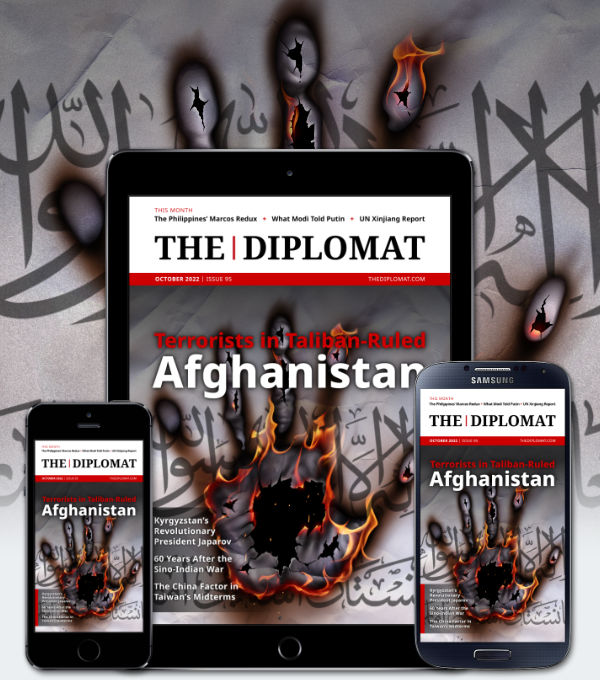| Welcome to the latest issue of Diplomat Brief. This week our top story explores the realities of life in a remote Afghan valley, where the Taliban ruled long before August 2021. We also have an interview with Dr. Victor Shih, a professor at the University of California, San Diego, and author of “Coalitions of the Weak: Elite Politics in China from Mao’s Stratagem to the Rise of Xi,” on changing trends in Chinese politics. |
| Story of the week |  | Society Life in a Far-Flung Corner of the Taliban EmirateWhat Happened: While the Taliban took over Kabul – and the governance of the entire country – in August 2021, they had already controlled some areas of Afghanistan for years or even decades. One such area that has long been under Taliban control is the remote Daren Valley in the eastern province of Kunar. Life in this mountainous region has always been hard, and while the Taliban takeover helped with some security problems it has left many other issues untouched. Our Focus: Locals are ambivalent about life after the Taliban takeover. Some report positive changes, like the fact that they can now travel to larger trading centers. “Before the revolution, we could not got to the bazaar in the main [Kunar] valley without running into problems,” one resident told reporter Franz J. Marty. Locals also report the presence of government inspectors and vaccinators in their valley for the first time. But there is also disillusionment among those who have supported (and even fought for) the Taliban for years that no reward is forthcoming for their service. Several villages reported an inability to get a paid post in the Taliban army or police force, despite expectations that such positions would be available. What Comes Next: Residents of the Daren Valley also pointed out longstanding issues that continue to plague their local area – and most of Afghanistan. For example, while fighting between the national army and Taliban insurgents has ceased, local conflicts driven by ethnic tensions remain. “We could not go to the bazaar [in the main valley] before [i.e. during the time of the Afghan Republic] and it is also not secure now,” one man told The Diplomat, claiming his brother had been killed on such a journey earlier this year. Meanwhile, poverty and unemployment continue to bedevil locals, another story replicated across Afghanistan. That remains one constant in these remote areas: No matter who rules the country, eking out a living is a daily struggle. Read this story |
| Behind the News | INTERVIEW Victor ShihVictor Shih, a professor at the University of California, San Diego, and author of “Coalitions of the Weak: Elite Politics in China from Mao’s Stratagem to the Rise of Xi,” on how Mao Zedong and Deng Xiaoping’s political strategies eventually culminated in Xi Jinping’s rise: “[T]he lack of competition from other princelings, as well as much stronger ties with the military, allowed Xi Jinping, one of the few princeling officials at the top level, to dominate the party soon after taking office as the general secretary in 2012.” Read the interview |
| This Week in Asia | Northeast Asia Japan, Taiwan Open up Their BordersThis week, both Japan and Taiwan finally open up to individual travelers, the culmination of slow shifts toward “living with COVID” by each government. Their hope is that tourism will begin to recover after over two years of pandemic restrictions. By contrast, China is clamping down on potential outbreaks even more tightly ahead of the 20th National Party Congress, which starts on Sunday. Find out more | South Asia India's Congress Party Will Get a New LeaderOn October 17, members of the Indian National Congress will elect a new party president – and, for the first time in 25 years, they will pick someone from outside the Gandhi family. The two contenders – Mallikarjun Kharge and Shashi Tharoor – have very different visions for the Congress, but either will face an uphill battle in rejuvenating the venerable political party. Find out more | Southeast Asia Thailand Faces up to Mass ShootingThis week, Thailand is struggling to come to grips with last weekend’s ghastly mass shooting in Nong Bua Lamphu, a province in the northeast of the country. A total of 36 people, including 24 small children, were killed in a knife and gun rampage by an ex-policeman who forced his way into a daycare center in the town of Uthai Sawan. As the town’s residents mourned the victims and laid them to rest, Prime Minister Prayut Chan-o-cha ordered the authorities to crack down on drug use and tighten the country’s tight but porous gun ownership regulations. Find out more | Central Asia A Rather Fragile Indestructible Brotherhood in Central AsiaOn October 9, amid continued tensions with Tajikistan, Kyrgyzstan cancelled the CSTO military exercise ironically named “Indestructible Brotherhood” that it was scheduled to host this week. At the same time, Kyrgyzstan decided to skip a different set of CSTO drills happening this week in Tajikistan. The Kyrgyz-Tajik feud is throwing a serious wrench into regional security initiatives. Find out more |
| Visualizing APAC |  | North Korea has been setting an unprecedented pace for missile tests, especially over the past three weeks. See the full picture |
| Word of the Week | Politics КустуризацияKusturizasia, literally meaning “forcing someone to throw up,” the term has become a colloquialism in Kyrgyzstan referring to Japarov and Tashiev’s approach to the fight against corruption. Find out more |
|  |




